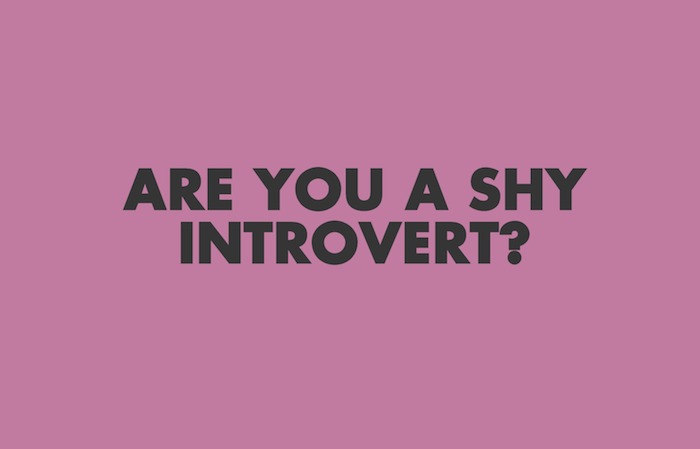
One of the most common misconceptions about introversion is that all introverts are shy. Of course, this is isn’t true. Shyness is related to a fear of social interactions. Introversion is a personality type that is evident from infancy.
But what if you are both shy and introverted? And what if you are only selectively shy (confident in certain scenarios and timid in others)?
Introvert blogger and musician, Andy Mort, creator of www.sheepdressedlikewolves.com, offers some interesting insights on the topic of shyness and introversion:
In her book The Highly Sensitive Person, Elaine Aron explains that she prefers to use the term ‘social discomfort’ rather than shy. She says we need to understand shyness within its context and that it is more accurately described as social discomfort emanating from a fear of being rejected by others. It is a response rather than an ever-present trait and so we must refrain from identifying people as naturally ‘shy’.
Thinking about it in terms of social discomfort is helpful because it shows that it is something we all experience at one time or another, and that it is not something we intrinsically ARE, but rather something we may feel in certain situations.
When people say you’re quiet
When someone says ‘you are very quiet’ it brings me a feeling of ‘social discomfort’ because it communicates judgement and feels like I am failing to behave in a way that is deemed to be ‘normal’. This can take me from feeling comfortable and accepted within a social situation, to feeling self-conscious and like an outsider, which in turn breeds a fear of what others are thinking, and thus ‘shyness’.
In many ways it can get quite confusing for introverts because quietness can slip from being comfortable and natural, to a feeling of discomfort shyness because of a few apparently harmless words.
When I was at university this was a constant struggle for me. We would frequently meet in small groups for seminars and I found it very uncomfortable. I couldn’t tell you the number of times I was put on the spot with a question from the lecturer ‘because I was quiet’ and therefore not paying attention. Invariably my response was incoherent nonsense, ‘I don’t know’, or even to falsely confirm their suspicions and just say ‘sorry I wasn’t listening’. I generally would be listening but at that moment simply unable to formulate and communicate a tangible thought.
It was not a good environment for me and not a conducive way for me to learn either. I spent more time worrying about what I would say if I was picked on than I did genuinely engaging with the topics. I became shy, lost my confidence, and stayed away from as many seminars as I could get away with missing.
Experiences like this are enough to lead us to believe things about ourselves as introverts that are not true. To be thrown out of your comfort zone, judged for being quiet, and demanded to respond to something on the spot, is not a very nice place for many introverted people. And so for this reason, the classroom very quickly became an environment of great social discomfort for me.
What to do about social discomfort
Identifying what is going on within us is important. I wish I knew about my introversion when I was at university. I imagine I could have managed things very differently, and not allowed the discomfort of an unsuitable learning environment to dictate how I saw myself more generally (stupid and an awful communicator).
It can be difficult to recognise what is influencing our social discomfort. Unless you spend time assessing the situation, the suitability of the environment, and the impact certain things have on your ability to function effectively, you might believe that the problem is 100% internal. The big danger is that as a result you might start to believe that you ARE shy, and start living the label, perpetuating this shy myth in every social situation.











I am introverted, and I also experience “social discomfort” usually when I am in groups of people that I don’t know very well, and even around people that I have known for a while but with whom I have not done much socializing. The way I try to handle it now is to practice mindfulness and self compassion. I acknowledge my discomfort and tell myself that it is ok to feel that way until the feeling eventually subsides or becomes less overwhelming. I most recently had a chance to practice this when I started volunteering as an ESL tutor a couple of months ago. At first, I actually was not very nervous and did not experience much discomfort because I was in an assistant role in the ESL classroom, so my role was to simply assist the main teacher by providing the students with extra help for in-class work. But after only a few classes, the center needed a volunteer ESL teacher right away and one of the staff members asked me to take on that role. I accepted the opportunity, but I was definitely nervous about being the center of attention in the classroom and how the students would respond to me and how I would handle it if I made mistakes while instructing. I remember that I was very nervous during my first class as the main teacher, but I got through it and realized that I liked being in that role. It has been a few weeks since that class, and I am a lot more comfortable now. I am comfortable instructing the students and interacting with them. I don’t mind making mistakes because I realized that everyone in the classroom is going to make a few mistakes from time to time and it’s very easy to correct myself and handle the students mistakes and to simply move on with the class. I am also more comfortable with getting my lesson plan together on the day of or the night before the class, instead of taking several days to plan out every little detail. At first, I would have felt very uncomfortable coming into class without being overly prepared.
So I think the key ways to handle discomfort, especially as an introvert, are to: 1) acknowledge discomfort 2) have self compassion 3) try to remain in the situation that brings about that discomfort because a lot of the time the discomfort will eventually go away. If the feeling remains after giving the situation several chances, then I think it’s reasonable to leave the situation and think of other options.
IntrovertedWanderer, thank you for sharing your experience as a teacher. I am an INFJ and I have been a teacher for 5 years. At first, it was challenging, but once you get more experience and feel competent in your ability, then the anxiety subsides. My students have no idea that I am an introvert. I am a “pseudo extrovert” in my classroom because that is where I come alive and where my passion is shown. Good for you for not giving up! Good luck in all future endeavors.
Esther, thank you for the reply and sharing a bit of your own experience as a teacher. I am not a certified teacher or anything like that, but because of volunteering with that center I mentioned, I suddenly found myself in the role of ESL teacher, when they needed someone. It has been an interesting experience, so far, and I definitely like being in that role because of the satisfaction that it brings me to know that I am helping out in the community and that others are benefiting. That’s one of the reasons that I didn’t just up and stop volunteering simply because I was nervous about taking on the role of teacher. I kept telling myself that I would be ok and that there is a pay off to doing something like that and that I had to think about the long term benefits instead of short term comfort for myself.
Good luck with your endeavors, as well.
Oh my gosh that’s the perfect term: social discomfort! I am a shy introvert. I’m terrible at meeting new people, awful in big groups, I get tongue tied and never know what to say. Hate it. That said, when with my close friends or my family, I’m really quite different – so it makes sense. I CAN call myself shy even thought it doesn’t affect me all of the time. I think Elain Aron’s book is one I should read. Thanks for the post!
I used to be shy introvert but nowadays I can overcome my shyness a little bit (even though I still can act shy in several situations/conditions that will get on my nerves) , I can be more confident now and try to make more convos with classmates even though I don’t act as extrovert like them, and I also still recharges a lot when it’s break times in school
Ima shy introvert, I have no problem talking to people I 100% know, even total strangers I can walk up to them and say hi, blah blah blah its part of my job as a sales associate……I have about a couple great friends and I’m fine with that…but people at work comment Often about my quietness and how they feel bad because it’s really hard to be loud and talk to other work employees….often times it’s the boss who points it out and I’m not sure what to do about it because it makes me upset and uncomfortable to have flaws pointed out about me when I could be in the next room…..I sometimes just think oh he’s just being a jerk and bullying me…..I mean is it a type of bullying and can I do something about it…..
Wow, this amazing article. It’s hurt when your environment always say why are you so quiet? Thanks for the advice stop labeling shy to yourself. It’s very great tips
Unfortunately, i enjoy activities that require a certain amount of extrovert behavior. I love teaching, but have to psyche myself up every time I enter a classroom. I am a dancer, and each time I get thrown into a large social setting, I am petrified of being asked to dance by someone I don’t know, because i get very self-conscious and nervous, and make mistakes. I enjoy my small groups where I know my dance partners. And on stage, I am confident, because I don’t have to interact with the audience! And with some people i connect very well, so they don’t get it when I tell them I am really shy.
Hi! I stumbled upon your blog while doing a quick search on shy and introvert for a writing project I am doing. I feel one of the confused people who wonder if introversion and shyness are really different. I felt that in many cases where professionals try to divide the two, they are just trying to distract us from believing we are shy when we are not.
I like how you discussed how someone could be “shy” in certain situations which I feel is the case for many of us. I considered myself a “painfully shy” kid because I was not the normal student- I withdrew from classmates and kept myself quiet unless asked. Yet, at home I was normal. So in a way I considered myself “shy”. But I overgrew that to what I am now as a forty-something professional. But I cannot deny that this demeanor is still strong. Am I shy? I think I am in certain situations. Do I need to forget it because I am actually just an introvert? No. I feel that I am both and in fact being an introvert is only brought about by my shyness- I learned to prefer situations where I am more comfortable with. But at the same time I feel bad about.
I think I am both introvert and shy- in certain situations (thank you for pointing out that out!)
I hope to read more of your insights 🙂
I’m almost 49 I do know I am shy and a introvert person. I have shut my self off to people most of my life or at least since I was 15 or so. The last four year I have been by myself and it seems to be getting worst. I do not go any where with anyone and no one comes over to my place. If I do go to someone’s place is cause I’m doing something for them. Everyone calls me when they need something built, fixed or just needs help with something. I feel that I’m falling deeper into the dark hole and since I also have trust issues with people it is very hard to talk to someone. I have seen doctors and tried to talk but it always ends up that they say being quite you can learn a lot about a person. I sit at home every night quite no noise, I put the radio on so there are voices surrounding me but it seems to make me sadder then I already am. I do not like to read, reading was one of my worst subjects. I am not very book smart but I can work with my hands wonderfully. Why am I writing this because no one I know knows how I feel. I wish I understood what most people understand when they read something but I don’t. I have no worries, I do not drink or do drugs and I have no intensions of hurting my self. My only bad habit I can’t break ins smoking. I do not know what I what from writing this but I guess I’m getting how I feel off my chest. Thank you for taking the time to read. content but not happy
contentnothappy
Very nice post, ? thanks for sharing! ? Maybe you’re looking at certain things the wrong way? What’s wrong with being a quiet type? Why not just accept it and enjoy your freedom, flexibility, spontaneity. There are many many introverts who have accepted that personality trait and are very happy people. They love life that way. Go on Facebook, type “introvert” in the search box, and you’ll see a number of pages for introverts. Take a look at their comments. We LOVE being introverts. I don’t want to know any other way.
cnt, growing up I was painfully “socially challenged”, but I realized it was because of a very disturbing, violent, and traumatic upbringing. It was so awful during those years not having friends. I felt so embarrassed on my way to school always by myself, while everybody else, and I mean EVERYBODY, all shapes, sizes, and colors, were with somebody(ies).
As an adult I eventually figured out that my gross social misfitness was not my fault, and I’ve fully accepted my introversion. I now love being alone. People have always gotten on my nerves, always DRAINING! I much prefer my own company. I wouldn’t want it any other way.
cnh, just one more thing. You mentioned that when reading you wish you can understand what other people understand when they read.
Been there. Big time. Reading can be a lot of fun. Here’s my suggestion. Go to the library or bookstore and look for something you feel you might like. Get a pack of index cards, either 3 x 5, or 4 x 6, and a good dictionary, like Oxfords. When you get to a word you don’t know, and at first there’ll be a lot of them you don’t know, write the word on top of an index card, its pronunciation (very important), and whether it’s a noun or verb etc. and the sentence the word is in.
In the back of the index card write the definitions.
Everyday read each index card, every chance you get, read the sentence and try to guess the meaning before turning the card around. Your stack of cards will keep getting larger, but it’s important to look at these cards everyday. Believe you’ll learn many words this way. It works. It’s especially uplifting when you come across a hard word where you all ready know the meaning of it.
Good luck my friend. Always be of good cheer, and God bless.
I have found myself reading the dictionary. It was easy to get lost in the words, I started with a word I wanted to know and then looked up words in the definition for the word
Greetings I am so grateful I found your website, I really found you
by error, while I was searching on Bing for something else, Anyhow I am here now and would just like to say many thanks for a tremendous post and a all round interesting
blog (I also love the theme/design), I don’t have time to read
through it all at the moment but I have book-marked it and
also added your RSS feeds, so when I have time I will be back to read
a lot more, Please do keep up the superb job.
My therapist has mentioned the word shy a number of times but I’ve never wanted to even contemplate the label let alone identify with it. There’s so much shame and stigma associated with being shy, especially in the Western world that I never wanted to view myself as shy. I always attributed characteristics of my shyness to introversion because even introversion seems to be gaining some traction in terms of social acceptance. Even today when I was curious about possibly loosely identifying with the label and consequently googled shyness, I came across a bunch of articles that just pathologizes shyness so much – shyness leads to depression and social isolation, shyness is associated with low self-esteem, shy people are seen as timid and weak, et cetera, et cetera, ad nauseam. It boggles my mind that people think that the way to overcome something that’s born of shame is to shame even more. This was the first piece that I’ve found that does not stigmatize shyness. I really appreciate your approach of mindfulness and self-compassion in dealing with “social discomfort” (which I’m assuming is a euphemism you chose to disassociate from all the negative connotations attached to the word shy?) Thank you so much for your article!